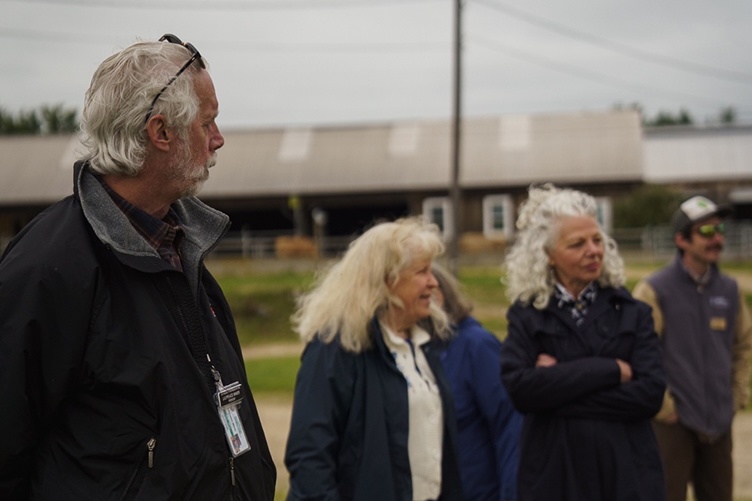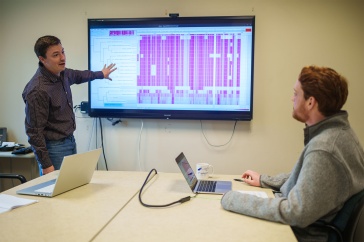
Members of the New Hampshire House Environment and Agriculture Committee visit the UNH Organic Dairy Research Farm
On a cool, cloudy day in late May, New Hampshire state representatives serving on the House Environment and Agriculture Committee visited two University of New Hampshire (UNH) agricultural research facilities to see first-hand how today’s research will impact tomorrow’s agricultural sector across the state. For a number of committee members — whose charge is to help the state’s legislative body assess matters and propose policies to address agricultural, environmental and waste management issues — it was a return visit to the state land-grant university’s research farm facilities. For many others, it was their first opportunity to see agricultural research with dirt underfoot. The experience provided them with a better appreciation of how discoveries and innovations from New Hampshire Agricultural Experiment Station scientists and statewide education efforts by Cooperative Extension closely align with the Committee’s work to support vigorous and sustainable agriculture and a healthy environment in New Hampshire.

Research Farm.
“It’s always a pleasure to host members of the Environment and Agriculture Committee,” says Anton Bekkerman, director of the NH Agricultural Experiment Station. “Not only is it an opportunity to share the latest research and updates on statewide extension efforts directly with our elected officials, but it enables our scientists and specialists to hear from the Committee about the challenges and opportunities that exist across our state’s many communities and industries. It is critical for us to be as responsive and connected as possible, and being on the farm rather than an office or meeting room always seems to bring out the most engaging, uplifting and productive conversations.”
The members’ visit to UNH and conversations with scientists and extension specialists touched upon every area of the Committee’s legislative goals, from improving animal health to establishing sustainable land use and to using animal waste as a heat source for greenhouse production. At the UNH Organic Dairy Research Farm in Lee, Claira Seely, assistant professor of agriculture, nutrition, and food systems in the College of Life Sciences and Agriculture and an expert in precision dairy technologies, presented her studies on using remote sensors in dairy farming. Seely noted the importance of research to maximize the potential benefits of the sensors by reducing labor costs, improving cow health and introducing operational efficiencies. Her goal is to make the sensors accessible and effective for smaller dairy farms common to the northeast so that farmers can quickly offset up-front technology adoption costs and benefit from their use. Katrina Klobucher, UNH Extension field specialist in livestock management, and Jason Scruton, manager of the research farm, also highlighted the need for combined efforts of innovation, education and policy to help strengthen the state’s food system by increasing value-added processing capacity and finding novel ways to support agriculture on a limited land base.

using compost for Heat.
At the Woodman Horticultural Research Farm in Durham, the conversation again turned to the importance of resilient local and regional food systems. Will Hastings, UNH Extension field specialist in horticulture, highlighted how his direct interactions and visits with farmers in Coos county is helping strengthen a trusted relationship among producers, communities and the University. Md Sazan Rahman, assistant professor of agriculture, nutrition and food systems in the College of Life Sciences and Agriculture, led the Committee members on a tour of a developing experiment for using heat generated by composting animal manure — a renewable resource across New Hampshire’s dairy and livestock farms — for small-scale greenhouses and high tunnels. If successful, the technology would allow New Hampshire’s family farmers to leverage an economical heat source for year-round growing while safely managing waste.
The farm tours also showed how UNH’s agricultural facilities support the hands-on training of the next generation of highly skilled workers for New Hampshire. The research farms provide opportunities for experiential, hands-on research, education and work for UNH undergraduate and graduate students. With seven animal and crop research and education facilities and 24 forested properties across the state, UNH offers an unusually large number of ways that students can get their hands dirty and become knowledgeableand passionate about supporting New Hampshire’s farms, forests, rivers and lives.
“It was really rewarding to see the Committee members take back to their communities and their colleagues in Concord some really great examples of UNH delivering on their tripartite mission of workforce development, innovation and life-long learning to support and grow New Hampshire’s agriculture and environment,” says Bekkerman.
-
Written By:
Mark Wanner | College of Life Sciences and Agriculture | Mark.Wanner@unh.edu

















































